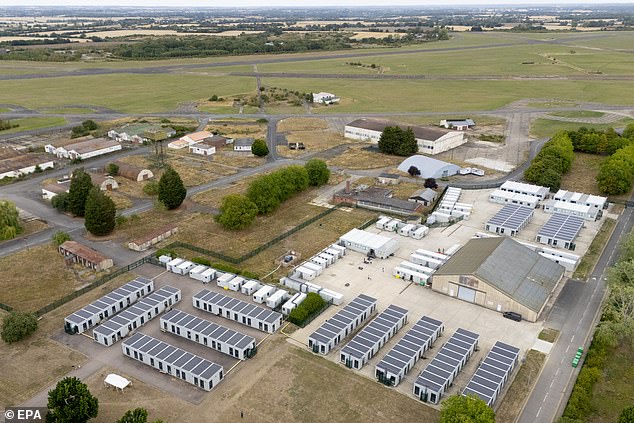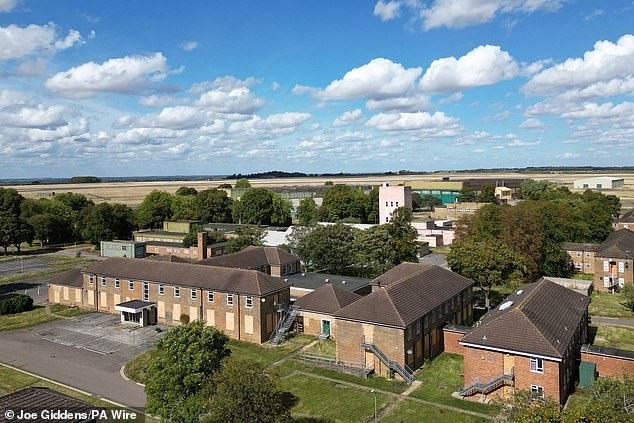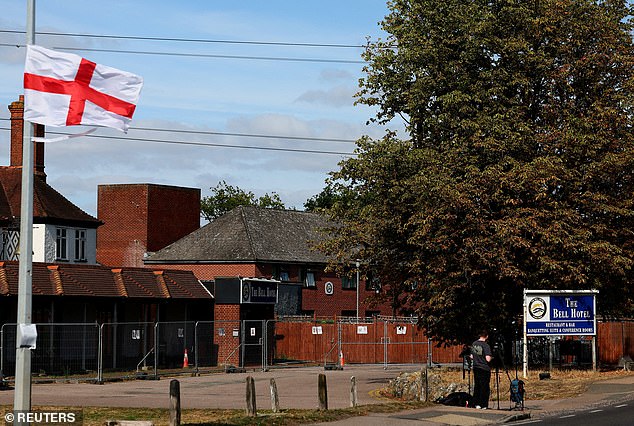Labour’s plans to house asylum seekers at military barracks might cost more than hotels, according to officials.
Sir Keir Starmer made another dramatic U-turn this week as his government pivoted towards using these facilities in a bid to close down controversial asylum seeker hotels.
The party had previously criticised the Conservatives‘ use of military bases but failed to fulfill its promise of closing RAF Wethersfield in Essex and Napier Barracks in Kent, the final two sites housing migrants.
New Home Secretary Shabana Mahmood, at the end of her first full week in the role, is expected to announce plans to convert military sites in the coming days.
According to The Times, sources close to her say she doesn’t see this as a question of money’ but ‘a question of public confidence’ and that she would be ‘more than happy to fight it out in the courts if she has to’.
Indeed, ministers are believed to already be pushing ahead with the proposals despite warnings that the shift in policy could cost the taxpayer more than the current £5.77million-per-day cost of migrant hotels.
Military commanders are working with the Home Office’s Border Security Command to pick some appropriate locations where temporary housing, including prefabricated modular units, can be set up.
Such units made up a large number of the ‘rapid deployment cells’ built to handle soaring demand for prison places after Covid.

Military sites, such as RAF Wethersfield, pictured, might cost more than hotels to house migrants, according to officials

New Home Secretary Shabana Mahmood, pictured, at the end of her first full week in the role, is expected to announce plans for the new accommodation in the coming days
The Conservative project to convert two military sites into asylum seeker accommodation ended up costing 12 times more than its budget.
Meanwhile, a National Audit Office investigation into four large sites under the previous government found that they had cost £46 million more than the £3billion spent on hotels at the time.
And the cost is not the only issue, with officials warning of asbestos in these buildings, as well as land contaminated by military-grade chemicals and explosives.
The location of such sites is also a potential stumbling block, with most of them some distance away from public transport, healthcare options and education establishments.
As a result, costly bespoke services might need to be provide to fulfill the Home Office’s legal duties to put on a minimu level of care and support for migrants.
A Home Office spokesperson said: ‘The department learnt a lot of lessons from the previous government’s experiments with military land.’
In March, the High Court ruled that the Home Office had acted unlawfully by housing three vulnerable asylum seekers at the former RAF Wethersfield base.
The independent chief inspector of borders and immigration had issued repeated warnings after he found rampant disorder at the site, including violence.

Luke Pollard, a defence minister, suggested that RAF Scampton, pictured, the base from which the Dambusters mission was launched in World War II, was a possibility for housing migrants
Health specialists also raised concerns over housing migrants with mental health issues at the accommodation.
In a six-month period last year, there were 14 suicide attempts at Wethersfield.
Last week, Luke Pollard, a defence minister, suggested that RAF Scampton, the base from which the iconic Dambusters mission was launched during World War II, was a possibility once again for housing migrants.
It was previously part of a £50m Conservative plan to house 2,000 migrants at the site – later reduced to 800 – which was eventually scrapped by Labour in 2024 as it did not provide ‘value for money’.
Locals have, in turn, vowed to defeat the plans once and for all, fearing the picturesque village will become swamped by asylum seekers.
There were hopes that the Conservatives’ plans being shelved would clear the way for the site to become a centre for aviation history, boasting a hotel and top-flight attractions such as the Red Arrows, but these are now under threat.
In his announcement this week, Mr Pollard said MoD military planners were now reviewing all sites including Scampton as part of a new government push to close down migrant hotels.
He said: ‘The Home Office has… decided against accommodation that the Ministry of Defence offered in the past. But we’re looking at all of them again at the moment.

Labour made another U-turn as it pivoted towards using these facilities in a bid to close migrant hotels, including the Bell Hotel in Epping, pictured, the subject of many protests
‘The Prime Minister wants all asylum hotels closed, as do I, as does the British public.
‘And by standing up temporary accommodation on those sites, we can support the closure of those asylum hotels even faster.’
Mr Pollard added: ‘We’ve deployed a military planning team into Border Security Command and the Home Office to look at military and non-military sites, about where we can help build temporary but adequate accommodation that enables us to transfer those folks from asylum hotels into that temporary accommodation so we can close even more hotels.’
Fury down in Epping, Essex grew after the Home Office won an appeal against the closure of their local migrant hotel – the Bell.
The Court of Appeal set aside an injunction granted earlier this month which would have stopped 138 asylum seekers from being housed at the hotel beyond September 12.
Lawyers for then Home Secretary Yvette Cooper had argued that shutting the hotel would set a ‘dangerous precedent’ that would have encouraged similar litigation by other councils.
The decision enraged Essex locals who have been protesting outside the hotel for weeks. Last week, they took to the streets as well as those further afield in Chichester, Cheshunt and Bournemouth taking part in anti-immigration demos.












